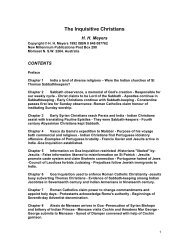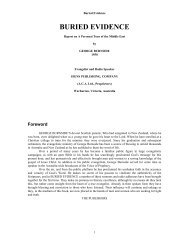Battle of the Bibles - Present Truth
Battle of the Bibles - Present Truth
Battle of the Bibles - Present Truth
You also want an ePaper? Increase the reach of your titles
YUMPU automatically turns print PDFs into web optimized ePapers that Google loves.
for Protestantism to bring forth a Bible that would not only expose popish perversions but<br />
would become a monument to <strong>the</strong> English language and a treasure to all who cherish<br />
truth and liberty.<br />
And who were better qualified for this awesome task than <strong>the</strong> godly scholars who<br />
were born and bred amidst <strong>the</strong> struggles <strong>of</strong> <strong>the</strong> Reformers? Their character had been<br />
refined by fire and shaped on <strong>the</strong> anvil <strong>of</strong> papal persecution. Surely none were better<br />
fitted to set about <strong>the</strong> task <strong>of</strong> transmitting <strong>the</strong> Word <strong>of</strong> God with conviction and sincerity!<br />
King James responded to <strong>the</strong> call. He appointed fifty-four learned men, all with a<br />
reverent regard for divine inspiration to bring into being a Bible that would reflect <strong>the</strong><br />
greatest possible concern to achieve fidelity <strong>of</strong> translation. By <strong>the</strong> time <strong>the</strong> work began,<br />
<strong>the</strong> number <strong>of</strong> translators had been reduced by circumstance and death to forty-seven.<br />
Humility, <strong>the</strong> hallmark <strong>of</strong> every true follower <strong>of</strong> Christ, was not lacking in <strong>the</strong>se<br />
great men. One <strong>of</strong> <strong>the</strong>ir number who was eventually appointed to write <strong>the</strong> Introduction<br />
to <strong>the</strong> finished Bible, Miles Smith, MA. D.D., was able to write:<br />
"There were many chosen that were greater in <strong>the</strong> o<strong>the</strong>r men's eyes than in <strong>the</strong>ir<br />
own, and that sought <strong>the</strong> truth ra<strong>the</strong>r than <strong>the</strong>ir own praise" ("The Translators to <strong>the</strong><br />
Reader").<br />
The thoroughness with which <strong>the</strong>se men were organised is well described by a<br />
modern-day admirer <strong>of</strong> <strong>the</strong> Authorised Bible - Benjamin G. Wilkinson, Ph.D.:<br />
"The forty-seven learned men appointed by King James to accomplish this<br />
important task were divided first into three companies: one worked at Cambridge,<br />
ano<strong>the</strong>r at Oxford, and <strong>the</strong> third at Westminster. Each <strong>of</strong> <strong>the</strong>se companies again split up<br />
into two. Thus, <strong>the</strong>re were six companies working on six allotted portions <strong>of</strong> <strong>the</strong> Hebrew<br />
and Greek <strong>Bibles</strong>. Each member <strong>of</strong> each company working individually on his task, <strong>the</strong>n<br />
brought to each member <strong>of</strong> his committee <strong>the</strong> work he had accomplished. The<br />
committee all toge<strong>the</strong>r went over that portion <strong>of</strong> <strong>the</strong> work translated. Thus, when one<br />
company had come toge<strong>the</strong>r, and had agreed on what should stand, after having<br />
compared <strong>the</strong>ir work, as soon as <strong>the</strong>y had completed any one <strong>of</strong> <strong>the</strong> sacred books, <strong>the</strong>y<br />
sent it to each <strong>of</strong> <strong>the</strong> o<strong>the</strong>r companies to be critically reviewed. If a later company, upon<br />
reviewing <strong>the</strong> book, found anything doubtful or unsatisfactory, <strong>the</strong>y noted such places,<br />
with <strong>the</strong>ir reasons, and sent it back to <strong>the</strong> company whence it came. If <strong>the</strong>ir should be<br />
disagreement, <strong>the</strong> matter was finally arranged at a general meeting <strong>of</strong> <strong>the</strong> chief persons<br />
<strong>of</strong> all <strong>the</strong> companies at <strong>the</strong> end <strong>of</strong> <strong>the</strong> work. It can be seen by this method that each part<br />
<strong>of</strong> <strong>the</strong> work was carefully gone over at least fourteen times. It was fur<strong>the</strong>r understood<br />
that if <strong>the</strong>re was any special difficulty or obscurity all <strong>the</strong> learned men <strong>of</strong> <strong>the</strong> land could<br />
be called upon by letter for <strong>the</strong>ir judgment. And finally, each bishop kept <strong>the</strong> clergy <strong>of</strong> his<br />
diocese notified concerning <strong>the</strong> progress <strong>of</strong> <strong>the</strong> work, so that if anyone felt constrained to<br />
send any particular observations, he was notified to do so" 6 ("Our Authorised Bible<br />
Vindicated", 1930, p 85).<br />
(6 In stark contrast to such openness, we shall later note <strong>the</strong> secretive way in<br />
which <strong>the</strong> fraud <strong>of</strong> Revision was thrust upon <strong>the</strong> English-speaking world.)<br />
The authorised Bible <strong>of</strong> King James became available to <strong>the</strong> public in 1611.<br />
Immediately it was accepted as <strong>the</strong> living Word <strong>of</strong> God and "a miracle <strong>of</strong> English Prose".<br />
A comparison with <strong>the</strong> Rheims-Douay Bible, <strong>the</strong> Old Testament portion <strong>of</strong> which was<br />
completed a couple <strong>of</strong> years earlier, only served to enhance <strong>the</strong> Authorised Version's<br />
popularity. It was immediately recognised as a death-blow to <strong>the</strong> supremacy <strong>of</strong> Roman<br />
Catholicism in <strong>the</strong> English-speaking world.<br />
Faber, a one-time Church <strong>of</strong> England clergyman who, like many <strong>of</strong> his ilk,<br />
endeavoured to Romanise his church and finally abandoned his Protestant cloak by<br />
8





